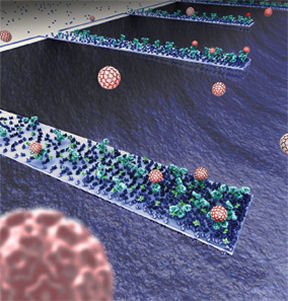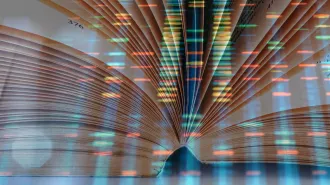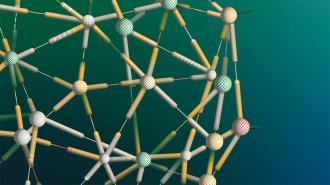Physicists have built tiny instruments sensitive enough to detect single molecules of DNA, and the construction of these sensors generally follows a simple rule: the smaller the better. However, this rule might have a limit, a new study finds.

Scientists have used microsensors to detect lone viruses, and some researchers have proposed using them to screen for HIV and cancer-indicating proteins (SN: 10/13/01, p. 237: Available to subscribers at Detecting cancer risk with a chip). The common assumption is that even smaller sensors could detect such particles more precisely.
Now, a team of researchers at Purdue University in West Lafayette, Ind., has discovered that nanosize sensors display different properties than larger ones. This unusual behavior could keep scientists from detecting viruses and molecules efficiently, says team member Rashid Bashir.
“As you go smaller, you have to be careful of other effects that start to come into play,” he cautions.
Bashir and his colleagues built several tiny silicon detectors called cantilevers, which resemble miniature diving boards that quiver slightly even at rest. The team coated the cantilevers with antibodies that attract a certain virus but not other microparticles. When a particle such as a virus attaches to a cantilever, the board’s vibration decreases enough that researchers can detect the event.
The team built cantilevers of varying lengths and 30 or so nanometers thick—much thinner and smaller than sensors used in previous tests, says study leader Amit K. Gupta, now at Harvard Medical School in Boston.
He and his colleagues measured the vibrations of the nanocantilevers before and after the team added antibodies. The nanocantilevers sometimes increased in vibration after being coated, which is the opposite of what the researchers had expected, they report in the Sept. 5 Proceedings of the National Academy of Sciences.
Scientists had assumed that antibodies coat a cantilever evenly. But when the researchers covered their nanosensors with fluorescently labeled antibodies, they found that the proteins clustered in patterns depending on the length of the cantilevers. On the longer sensors, the antibodies bunched up at the free end of the diving-board structure.
Some of these bunches were almost as thick as the cantilevers themselves, and the researchers conclude that this caused the unexpected vibration.
“This doesn’t preclude [nanocantilevers] from being used for sensing, but you have to be aware of this fact,” says Gupta. He suggests several ways in which future designs might take this factor into account.
In the thicker cantilevers used previously, an uneven antibody layer wouldn’t have had a detectable effect on vibration, Bashir says.
The idea that proteins collect toward the end of a nanocantilever is intriguing, says physicist Harold Craighead of Cornell University. But he finds it “not at all surprising” that layers of antibodies that are thick relative to the sensor would alter its vibrations.






